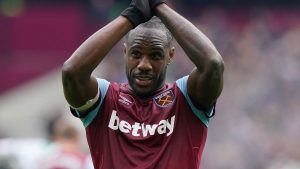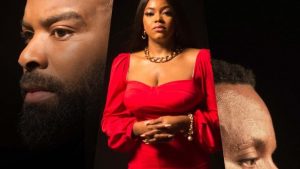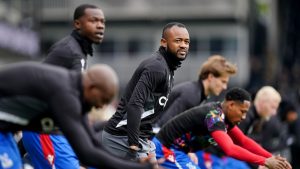From kneeling to the black W: Ex-Badgers discuss social justice issues
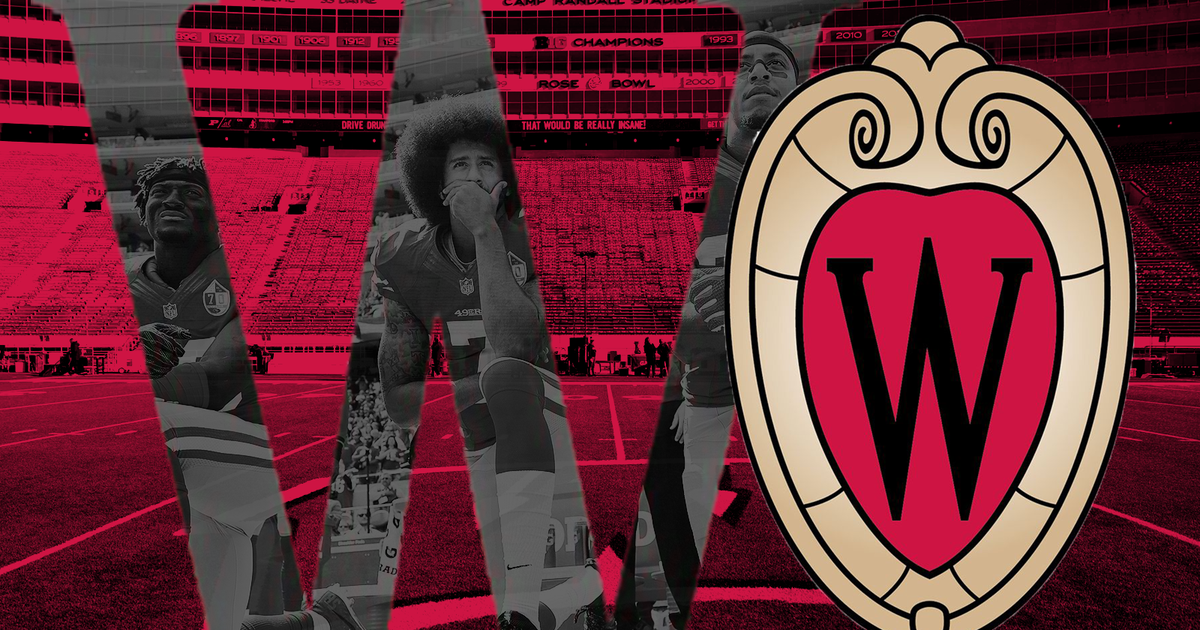
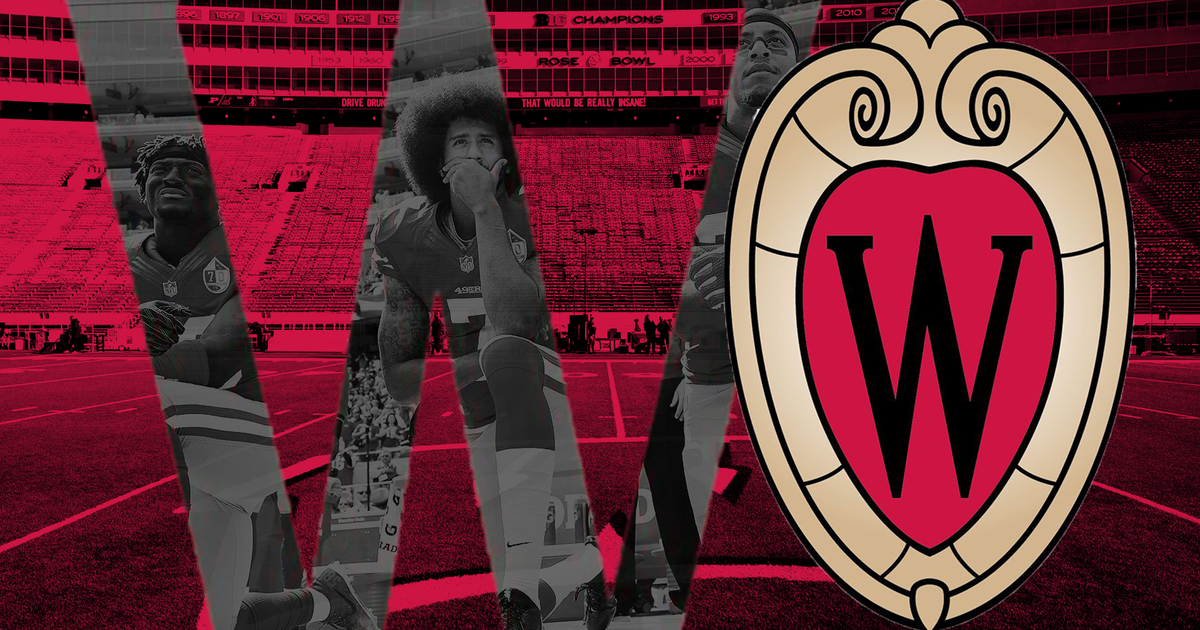
Marcus Cromartie lives in Los Angeles but he likes what he’s seeing going on at the University of Wisconsin — in terms of social justice movements.
This past summer, Black athletes on campus came up with the idea of putting a Black W patch on uniforms and a sticker football helmets to send, as the university put it, a “message of solidarity and inclusion with the University’s Black and underrepresented communities.”
The same group of athletes later floated the idea of a $2 million yearly scholarship to be given to incoming Black students in need of financial help, to help rise the population of African-Americans on campus. The most recent study by the Princeton Review shows that of the 33,456 students enrolled at Wisconsin, just 1.9% are Black.
“It’s a step in the right direction,” said Cromartie, who was a defensive back for the Badgers 2009-12. “I still talk to a lot of guys on campus, and they just want their voices heard.”
More Badgers coverage
Cromartie knows a thing or two about social justice movements. He was at Ground Zero of the modern form of social protest by athletes.
It was in 2016 when Colin Kaepernick, then the quarterback of the San Francisco 49ers, first took a knee during the National Anthem as a protest against police brutality the oppression of Black people in the United States.
Kaepernick first sat down during the anthem in San Francisco’s third preseason game before kneeling – on advice of Nate Boyer, a former Green Beret who was a long snapper for Seattle in the 2015 preseason. The move garnered attention. But with the 49ers’ opening game of the 2016 season on Monday Night Football, everyone knew it was about to garner a lot more attention.
“I remember us having a team meeting, everyone giving their views, did they oppose of him kneeling, did they not, and Colin basically spoke to as why he thought it was important for him to kneel,” Cromartie recalled. “He never advocated for everybody else to do it, but it was about I have to speak for the people who have no voice.”
Cromartie, an undrafted free agent who finally made an opening-day roster for the first time four years after entering the league, felt he was in a precarious position. He didn’t have the cachet of a starting quarterback or NFL superstar. Losing his roster spot, he felt, might not be out of the question. Complicating matters, he had a son on the way, to be born later in October.
He talked to his father – both of his parents were in the military for 20 years; his mother in the Navy and father the Mariners – to get his advice.
“I actually remember my dad telling me, ‘Look, I have no problem with you kneeling but you have to think about your family’,” Cromartie said. “’Not just you, but the fact you have a son about to be born, the fact you have to provide, I don’t want you to lose your job because of it.’
“My parents being Black Americans, they understand the inequality. Both my parents grew up in a very poor neighborhood, so they understand where he was coming from.”
Cromartie ended up not kneeling. However, after the anthem was over, he and a couple of his teammates went over to Kaepernick and hugged him, to ensure both he and a national TV audience knew the 49ers quarterback was being supported.
The reaction to the kneeling was worse than Cromartie imagined. Some cities were better than others, but he witnessed vile reactions from fans.
“I hate to say this, but it was almost like the Jackie Robinson days of him going city to city.” Cromartie explained. “Obviously (with Robinson) it was people throwing eggs at the bus. With us, it was posters. Go back to wherever you came from. Very hateful things.”
Looking back, Cromartie said he has regrets about not kneeling. Yes, very few players did it at the time, largely because there was a lot of unknowns, and it was thought one could have been met with peril by being involved.
“I do regret now kneeling because I felt that was a very powerful statement,” Cromartie said. “I don’t know what the blowback would have been for myself but if I would have kept my job of course I would have kneeled.”
While Kaepernick and kneeling players were often treated rudely by fans in 2016, a year later things intensified when President Donald Trump said, in part during a speech, “Wouldn’t you love to see one of these NFL owners, when somebody disrespects our flag, to say, ‘Get that son of a bitch off the field right now. Out. He’s fired. He’s fired!’”
Austin Traylor, a tight end at Wisconsin from 2012-15, was with the Denver Broncos when the president made his remarks. Like Cromartie, Traylor was an undrafted free agent and not likely to make waves based on his standing in the NFL’s roster hierarchy.
I hate to say this, but it was almost like the Jackie Robinson days of him going city to city. Obviously (with Robinson) it was people throwing eggs at the bus. With us, it was posters. Go back to wherever you came from. Very hateful things.
Marcus Cromartie
Also, like Cromartie, he didn’t kneel.
“I didn’t kneel personally because I thought the message going on was getting lost behind the controversy of the statements the president had made at the time towards the NFL players,” Traylor explained. “So, I didn’t want to kneel and take away from the message that was actually and the reason the kneeling was started by Kaepernick.”
Traylor said Denver’s captains held a meeting to discuss the situation and in the end a number of players knelt while other locked arms or raised their fist.
“Everyone wanted to do something in unity together,” Traylor said. “I think that was just a big message Denver was sending at the time.”
Three years later and kneeling has become almost commonplace. Nowadays, it’s popular to kneel. That wasn’t the case in 2016.
“From my perspective, people who kneel, it’s kind of just a placeholder,” Cromartie said. “I felt in 2016, there was fear that came along with it. There was a certain type of guts to do that. Now it’s more of a demonstration of this is what we’re going to do as a team. It’s been watered down, to be blunt.”
Still, Cromartie doesn’t want to overly criticize anyone’s choice to kneel or not kneel. He said, “everyone has their own form of protest.” Out of the NFL since 2018, Cromartie over the years has spent his money and time to help his surrounding community.
Previous Coverage
NFL players have tried other ways to bring attention to social injustices. In the first game of this season, players from Kansas City and Houston locked arms and asked for a moment of silence for racial unity. Some Chiefs fans booed.
“It’s hard for people who have lived blue-collar lives or have otherwise struggled to empathize with other people, especially millionaires. Whereas I can sit back and say I see two different people that have had lives that struggled and I can say well your life wasn’t a struggle because of the color of your skin,” Cromartie said when asked about that incident. “And that’s the difference. Being white doesn’t promise you a great life. But it promises you that you won’t be judged for the color of your skin.
“I believe it’s hard for people to have empathy and say why should I feel sorry for him when my life is just as bad. That’s not the point. These people are the way they are because of the way they look or the way they may say a word or the way their attitude may come off to a police officer, and I feel that’s the simple disconnect, we don’t have the understanding. When they locked arms and booed I felt that was another example of people not having empathy and understanding.”
Both Cromartie and Traylor applaud Wisconsin for its initiative with the Black W logo. They are also both hopeful the $2 million scholarship takes hold. However, that movement has received a little pushback on social media. For example, there have been comments wondering why it’s only for Black students in need and not white.
“I understand that reverse argument,” Traylor said. “But this is why I think it’s important to get people around more Black people. The structure of the U.S. and how it has oppressed Black people over the year, and it’s put kids who are deserving behind the 8-ball just because they’re Black. And this country was built historically on not even counting Black people as full humans. A lot of people don’t want to see how that path impacted this present, but it has a direct impact.”
As far as how to raise the money, Traylor noted “If the athletes support the scholarship and it’s something they want to do, I think they generate enough money for the university to do it. Sports in a whole supplies a lot of money to the university.”
Cromartie added he’d like to see a better support group for athletes on campus. He knows Florida State has a community of athletes across sports and eras who can reach out to each other – for example, he said his friend E.J. Manuel, who was a quarterback at FSU and in the NFL, regularly talks with pro golfer and former Seminole Brooks Koepka – and he’d like to see something like that for Wisconsin. Cromartie said former Badgers wide receiver David Gilreath is attempting to launch such a community at the school.
Just having others to talk to – and not necessarily just other football players – would be helpful, said Cromartie.
“I think it’s harder for guys to succeed at Wisconsin if you come from a lifestyle that isn’t able to help you,” Cromartie explained. “For instance, I thought Kraig Appleton (a highly recruited wide receiver from East St. Louis, Ill., who played just one season at Wisconsin in 2009, was suspended and eventually left school) didn’t get the support he needed.
“I know he had a lot of baggage that came with him. But would he have succeeded at another program? Maybe. Maybe those coaches would have been a little more helpful, I don’t know. I don’t know if (Wisconsin) was a program where you go to get your act together. I feel like you need to have your mind alright. Kraig, and it’s just an example, he didn’t have everything going right in his life and coming to Wisconsin wasn’t the right choice for him, maybe. Obviously, he made some very poor choices in his life and it’s not Wisconsin’s fault he made those poor choices, but who knows how his life would have went if he had gone somewhere else.”
Former Wisconsin linebacker Jaevery McFadden, a teammate of Appleton in 2009, concurred with Cromartie’s assessment.
“Kraig was def in a different environment when it comes to where he came from and him going to Wisconsin. It’s was a culture shock to him,” McFadden wrote in a Twitter direct message.
On the flip side, there’s Traylor, who came from a majority Black populated inner city in Columbus, Ohio. Traylor credits Joe Rudolph, his recruiting coach, for continually checking in on him, his roommate Melvin Gordon, who was from Wisconsin and could help him acclimate to his new surroundings, and fellow tight end Sam Arneson, from small-town Merrill, Wisc., with whom he had some good, frank, long conversations about many things, including race.
“Originally getting to Wisconsin would I say it was normal? No. It was definitely a change for me, it was a culture shock,” said Traylor, who noted in high school he had perhaps three classes which included white students and coming to Wisconsin his classes were now filled with people of a different color than him.
McFadden had a similar experience. On his very first day of classes at Wisconsin, he entered a lecture hall to find he was the only Black student among the around 100 in attendance. A white woman eventually sat next to him and the two engaged in a conversation.
“She then leaned over and said ‘You know you are the first black person to every be in one of my classes? And most of my schools only have about 2-3 black people in the whole school.’…I was stunned,” McFadden remembered. “LOL it was like this was her first time having a conversation with a black man. And she was very intrigued. As I was with what she was telling me. I don’t know why I will never forget that. Was a good conversation.”
Not all interactions in Madison or Wisconsin ended up this pleasant when it came to matters of race. All three players mentioned they had their share of uncomfortable moments. Cromartie recalled coming back from the wedding of teammate Bradie Ewing, who is from Richland Center, Wisc., with some other Badgers defensive backs – Antonio Fenelus, Aaron Henry, Peniel Jean and Shelton Johnson.
Originally getting to Wisconsin would I say it was normal? No. It was definitely a change for me, it was a culture shock
Austin Traylor
It was just before midnight when a police car pulled the group over. The officer told them they were driving erratically — which Cromartie denies, saying none of the five had been drinking. All five were told to show proper identification.
“He was very suspicious of even why were in the city, where we were coming from, why were we out this late. Fortunately for us I guess he radio’d us in and it came back we were athletes and we were on our way, but we were for sure racially profiled,” Cromartie recalled. “You got five Black guys, four of them with dreads, why are they coming from this 99.9% white city, like what are they doing?
“There’s always stuff happening in Madison but that one thing sticks out to me because you know when you’re being racially profiled when you know you haven’t done anything wrong. I’ve never been in a situation where people in the back seat were ID’d as well. It was a situation that was very eerie for me and I’ll always remember it. It was scary for sure. I was 19-, 20-year-old kid. You’ve never been in a situation where you feel like you’re the threat but you’re still scared, though.”
Said Traylor of things like being racially profiled or people making presumptions about him (i.e. you must be an athlete) because he’s 6-foot-4 and Black): “All that stuff has happened, I didn’t take offense to it. I knew the college demographic before I went.”
Earlier this summer, former Wisconsin cornerback Derrick Tindal made implications on Twitter that quarterback D.J. Gillins, who was at UW from 2014-15 before transferring, ripped apart the Badgers defense on scout team and didn’t get an opportunity to play because he was Black. Tindal also took Wisconsin to task for having Jack Dunn, who is white, as their punt returner (note: Tindal did not respond to a request to comment for this story).
“I do not feel race was a factor in that,” Traylor said, in regards to Gillins, “but other than that I have no comment (when asked if he felt there were football decisions made due to race).”
“Coaches have favorites. Is it racial? I don’t believe so,” said Cromartie, who noted in his time the entire secondary was Black, so that never was an issue for him. “I’m sure I played with guys who thought their white counterpart got more playing time because they were white. … I won’t say I saw it or experienced it at the University of Wisconsin, but I won’t say it hasn’t happened either. I know Derrick Tindal isn’t the only guy who feels that way.”
As witnessed in 2020, racial issues are hardly behind us in Wisconsin or as a nation. Cromartie said communication remains a key as well as education. He tries to do his part through social media, speaking engagement and television appearances. Cromartie remains in contact with Kaepernick as well, to get his thoughts on certain issues or ideas.
Looking back to 2016, when Kaepernick first kneeled, Cromartie thinks America has come a long way. But there’s still many miles to travel.
“I think the one thing the kneeling did more than anything was start a conversation that needed to be started,” he said. “Right now, we’re in the midst of it. Literally every month something new is coming up. If not every month, it’s every week. There’s so much coming to forefront that’s always been there, but now we’re talking about it more. It might not be our generation or even the next, but we need to make steady strides to talk these things out.
“We lack empathy. Us as humans lack empathy. … I feel like white Americans have to understand, yeah, I didn’t grow up like this, but I can empathize with someone who did. I feel like that’s where we need to get to as people. I know Colin has changed the minds of several thousands of people and if one person can do that, imagine what multiple people can do.”


